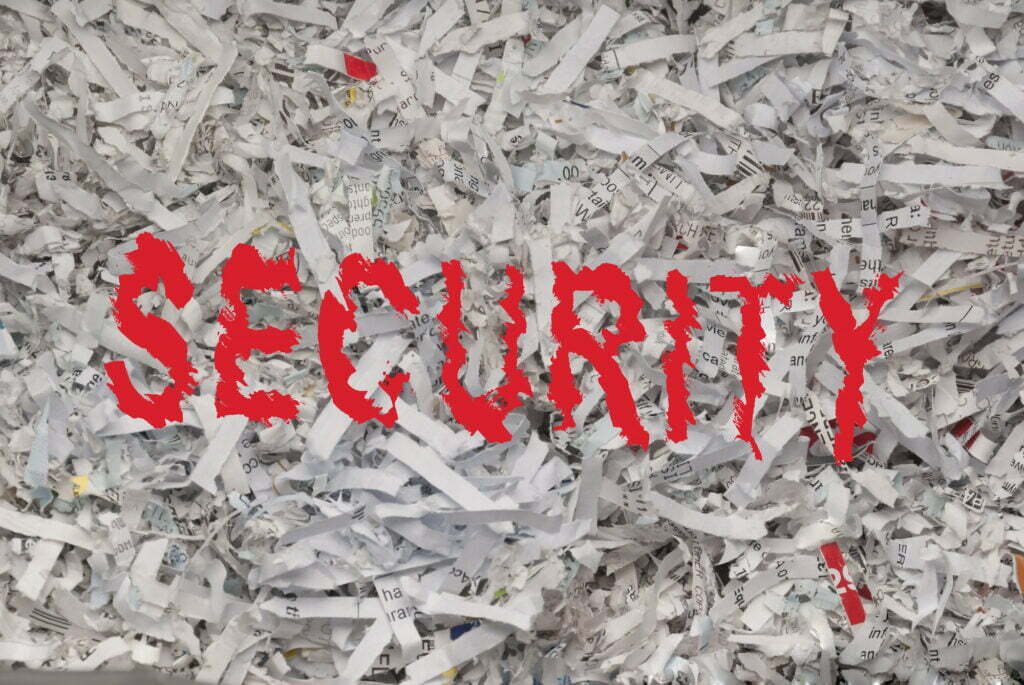Not all shredders are created equally. Instead, there are a number of different factors which go into making sure that your record destruction meets certain standards. When you’re trying to discover which shredder is right for destroying paperwork from your business then you’ll need to understand shredder security levels.
Read on and we’ll explain exactly what you need to know so you can stay in compliance with modern standards.
Which Shredder Security Level Do I Need?
Before we get into the requirements for each level of security, it’s important to understand that not everyone needs something which is going to meet the highest security standards. But, wouldn’t you want to make sure that all of the documents you’re getting rid of are properly destroyed?
You may think “I’m just disposing of some old records with no personal information, I don’t really need NSA level security.” Which may be true, but if it’s worth shredding, it’s worth shredding properly.
Paper shredders which operate at level 4 are enough for most commercial uses, although those who handle a lot of sensitive information may want to go with a level 5 paper shredder instead.
FACTA compliance is a big issue for many companies since all consumer information now requires a high level of protection. A level 4 shredder is the bare minimum which can be used for disposing of this information.
Shredder Security Levels
Currently, the code for security levels is covered under DIN 66399. This European standard has been adopted stateside, although there are some slight deviations put in place by the NSA for top secret documents.
The levels in place are the following:
Level 1
Level 1 shredding is mostly used just to get paper out of the way. It’s suitable for much of the paperwork which comes through an office and doesn’t carry any sensitive information.
Old brochures and the like are commonly shredded at this level.
Level 2
Level 2 shredders can be used to dispose of slightly sensitive internal communications. Memos, forms without personal information, out-of-date instructions, or travel guidelines are good examples of documents which should be shredded in compliance with this level.
Level 3
Sales reports, receipts, and other financial information which doesn’t contain personal identifying information can be handled with a level 3 shredder. These aren’t HIPAA or FACTA compliant, however.
Level 4
The first level of shredding which is compliant with HIPAA and FACTA standards. All customer personal identifying information should be handled with at least a level 4 shredder in order to assure security.
Level 5
Level 5 shredders are probably the highest standard in common commercial usage. They should be considered if you’re planning on disposing of strategic paperwork for your company, competitor analysis, and other information which can be used in corporate espionage.
Level 6
Often used in healthcare and financial environments for a blanket level of security, level 6 shredders are able to handle some of the most sensitive information. At this level of shredding it’s extremely unlikely that someone will be able to reproduce the papers even with state-of-the-art technology.
Level 7
The highest standard currently in place is level 7. It’s used primarily by government entities like the NSA in order to ensure that even the most sensitive and dangerous information can’t be reproduced.
While some of the higher level shredders may help destroy your documents, high-security shredders tend to be slower and can interrupt the workflow in your place of business. Instead, why not save yourself time and money by choosing a document shredding service
Picking a Shredding Service
Fortunately, you don’t have to keep track of all of this if you choose to invest in the right document managing service. Shredder security levels are a good thing to know but wouldn’t it be better to know that your documents are held in a secure location until their final destruction? And, they’re destroyed with papers from other companies, so there’s no way anyone would be able to reconstruct your sensitive documents.
Contact us today and let’s see what we can do to help you make sure you stay in compliance with the law and protect your sensitive information from prying eyes.


